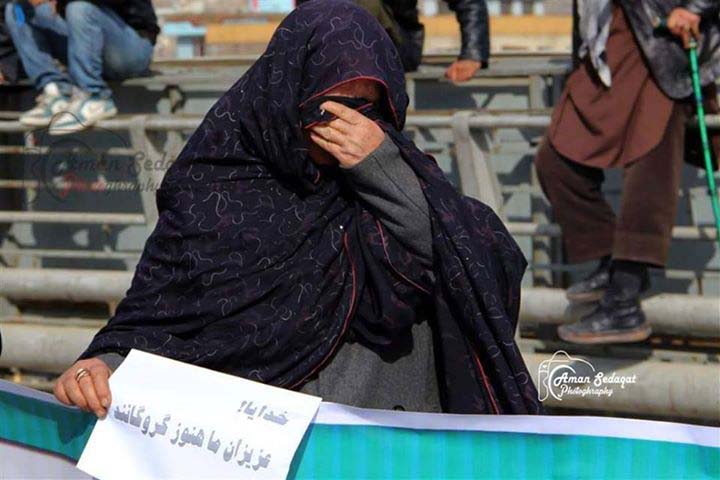A group of activists staged a re-enactment of abduction of 31 passengers who were seized from Shah Joy district of southern Zabul province by unknown masked men on February 24th.
The abductees had heavy chains fastened around their legs and arms and forced to lie on the ground before the eyes of their family members. Bitter tears rolled down the wrinkled cheeks of their old mothers – whose swollen eyes clearly reflected their anguish.
The abduction of 31 passengers sparked wide protests across the country and raised public concerns. The activists claim President Ashraf Ghani in a ten minutes meeting with abductees’ families in the Presidential Palace presented a grim picture. Relatives of the kidnapped passengers have lost ray of hope after meeting the president. The government has no clue about the passengers’ whereabouts. They said that though the authorities tried to rescue the hostages but could no more assure their safe release.
“We contacted the Taliban through tribal elders but Taliban said they are not behind this kidnapping. We believe they are Daesh (ISIS).” These words were spoken by Abdul Khaliq Ayubi, a local government official soon after the abduction. Afghan officials confirmed in January that ISIS was operating in southern parts of the country.
However, the abductors were said to speak in a foreign language and were believed to be foreigners. As far as I can tell the Afghanistan’s porous border is crossed widely by the mass militants who carry out terrorist acts inside the country. According to analysts since the Taliban militants are not ruled by a central power, a number of them have pledged allegiance to Daesh to have their supports in militancy and terrorism. This fact was revealed when a drone strike killed the top recruiter for Daesh in Afghanistan. So, the abductors must be the Taliban – who share strong ties with Daesh – from across the border.
Following the abduction, media reports suggested that the abductors demanded release of insurgents from Afghan prisons – which was turned down by the Afghan president. This supports the evidence to claim that the Taliban were behind the incident.
Daesh, however, has raised the officials’ concerns. As a result, President Ghani said on his trip to India as, “With all apologies to Microsoft, if al-Qaeda was Windows One, Daesh is Windows Five. Terrorism is fast changing its ecology and morphology and its communication strategies.” Then he suggested “four phases” to counter terrorism, which are “called observe, orient, decide and act. It’s called OODA.”
Based on President Ghani’s view, Daesh poses further threats not only to Afghanistan but to the whole region. This anti-Iraq product which has infiltrated to Afghanistan will expand its realm of militancy to regional territories if an effective strategy does not be adopted forthwith to counter it. The world must be on alert of the poison spew forth by the IS and have to stop this turbulence.
Talking about impacts of the military operation conducted by Pakistani military forces in Waziristan, Ghani said that the operation had displaced hundreds of militants which have impacted the security situation in Afghanistan. This comes when Afghan interior ministry said earlier that a large number of militants from Pakistan were joining Afghan Taliban’s Spring Offensive.
Last Thursday, however, the Pakistan Foreign Office rejected the allegation about the influx of terrorists in Afghanistan from Pakistan and called for closer cooperation to deal with the issue of cross-border terrorism. Pakistan FO Spokesperson Tasnim Aslam denounced Taliban’s Spring Offensive and emphasized on peace and reconciliation in war-ravaged Afghanistan.
Referring to the economic corridor, which Pakistan intends to build in cooperation with China, the spokesperson observed that peaceful neighborhood, particularly a peaceful Afghanistan, was necessary to fully benefit from the project that is being seen by many as a “game-changer” for the region.
She also reminded the Afghan government about the steps taken by Islamabad for improving bilateral relationship.
Ms. Aslam recalled the improved border coordination between Pakistan and Afghan security forces and the counter-terrorism operation (Zarb-i-Azb) that Pakistan started in last June.
She said it had been Pakistan’s policy that no-one would be allowed to use its territory against Afghanistan and accordingly expected Kabul to reciprocate.
Reports show that frequency of militancy and terrorism has been increased in the New Year and in Afghanistan leading to great civilian casualties. In the first three months of 2015, civilian casualties from ground engagements rose by eight per cent compared to the same period in 2014. Ground fighting between pro-government forces and Taliban militants caused 521 civilian casualties, with 136 civilians killed and 385 injured – based on UNAMA’s findings.
Nicholas Haysom, the Secretary-General’s Special Representative for Afghanistan and head of UNAMA, has said earlier that UNAMA was particularly concerned about the impact on civilians of further conflict-related operations by the Afghan National Security Forces and anti-government elements in the coming months.
After 31 passengers were abducted by the militants, their relatives and rights activists set up a protest camp in Zarnigar Park, not far from the Presidential Palace, as a last resort after multiple protests. More than two months has passed from this sit-in, but the demands were not met. Their families show deep concerns about the abduction of their bread-winners and urge Afghan officials to take note of their problems. Since insecurity and unemployment are the major challenges in Afghanistan, the victims’ families are in dire need of bread and butter. I hope they have their demands met in near future.

